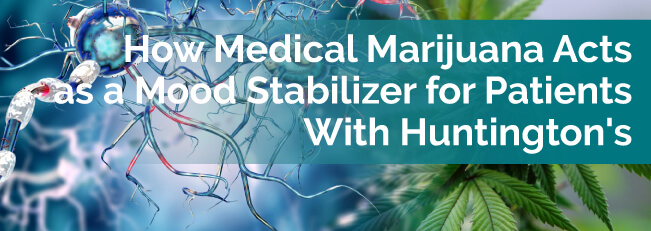
For families devastated by Huntington’s disease, the search for effective treatments for this debilitating condition is their primary concern. After the initial onset of this incurable disorder, nerve cells quickly become damaged, causing irreparable deterioration in the brain and affecting all areas of the patient’s life. As it progresses, Huntington’s impairs a patient’s ability to walk and reason.
Two of the earliest symptoms include mood swings and out-of-character behavior. Other problems with motor skills also develop, but families and friends may notice these psychiatric changes even before movement difficulties. It can be frightening or confusing when a normally even-tempered loved one has an aggressive outburst or becomes lethargic.
As the disease continues, shifts in mood may be more commonplace. Most doctors prescribe anti-depressants to help with this, but they’re often accompanied by adverse side effects that Huntington’s patients may not have the strength to deal with.
Many patients and caregivers are turning to medical marijuana to aid Huntington’s many symptoms. Not only does it treat the pain associated with the disorder, but it also can help stabilize a patient’s mood. If you or a loved one need help dealing with some of the psychiatric symptoms associated with Huntington’s, cannabis could be a positive treatment option.
As deterioration in the brain continues, patients with Huntington’s become overwhelmed with all types of symptoms that affect three main areas of a patient’s life:
Sometimes, patients with Huntington’s develop psychiatric symptoms before their motor skills become affected. The most common mood-related symptoms associated with the condition include:
These changes in behavior are often the most distressing aspect of Huntington’s disease for a patient’s family and friends. Sometimes the disease itself causes patients to feel frustrated or irritable as they begin to show signs of motor function loss. However, the real cause of these mood changes is deterioration in certain parts of the brain. Some of these behavioral changes can be predicted, as Huntington’s often affects specific areas of the brain.
The primary reason medical marijuana seems to be such an effective treatment for conditions like Huntington’s is its ability to treat our endocannabinoid system (ECS). This system acts as a bridge between our body and brain. ECS receptors can be found in every major bodily system, affecting everything from digestion, sleep, the nervous system and even mood.
The main compounds in marijuana, known as cannabinoids, interact strongly with our ECS. Researchers are discovering the tie between cannabis our endocannabinoid system could be the key to effectively treating many debilitating conditions.
One way cannabis interacts with our ECS is as a mood stabilizer. Research studies show when patients suffering from psychiatric disorders like anxiety or depression take medical marijuana treatments, their symptoms are decreased dramatically. And whereas many medications prescribed to help anxiety or depression may cause adverse side effects, cannabis is relatively safe by comparison.
Some strains of marijuana cause feelings of joy or euphoria, lifting a patient out of their depressive mood. Other strains, like strong indicas, are more sedative in nature, perfect for patients with manic symptoms who need help sleeping.
If you feel that medical marijuana could help stabilize the mood of a patient diagnosed with Huntington’s, our advice shouldn’t replace that of a doctor or local budtender. Be sure to make an appointment with a medical marijuana doctor or visit a dispensary near you.
For more information about how cannabis can be used to treat Huntington’s Disease, check out our resources:


Please allow us to access your location to find local dispensaries.
VIEW ALL DISPENSARIES ➔